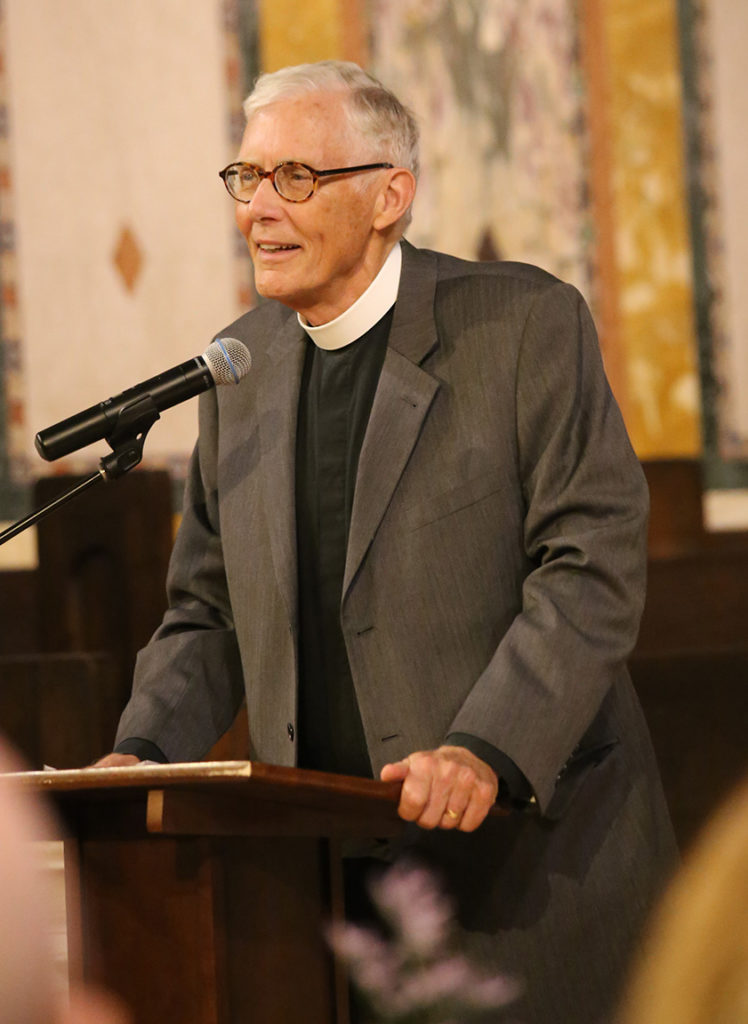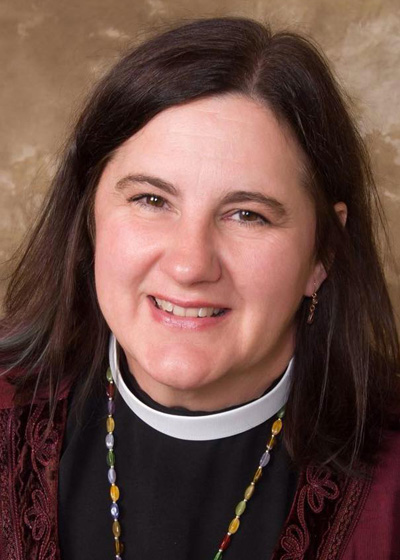
Dean Gary Hall, new chair of the Program Group on Mission Congregations, delivers the keynote address at the 2019 Bishop’s Dinner at St. John’s Cathedral. Photo: Janet Kawamoto
[The Episcopal News] Planting worshipping communities in underserved areas is just one aim of the Very Rev. Canon Gary Hall as he assumes leadership of the diocesan Program Group on Mission Congregations, beginning this month.
“The biggest part of our work has historically been approving mission development grants (MDGs) from the diocese to mission congregations,” said Hall, who has served on the program group for the past two years.
He succeeds the Rev. Canon Kelli Grace Kurtz, rector of All Saints Church in Riverside, who led the program group for 15 years. Hall has also served as interim dean of Bloy House, the Episcopal Theological School at Los Angeles, for the past two years.
The diocesan Mission Share Fund awards grants to some 27 mission congregations, intended to aid retention of consistent clergy leadership and general operating expenses – grants that were reduced overall by about $100,000 in the current budget. About $1 million is typically awarded yearly in MDGs, ranging from about $4,500 to $88,000.
A mission congregation receives financial assistance and is incorporated as part of the diocesan structure. A parish is self-supporting and separately incorporated, though it holds its property in trust for the diocese.
“With Canons Kurtz and Hall serving back to back, surely this will be remembered as the golden age of the program group,” said Bishop Diocesan John Harvey Taylor. “Kelli Grace and her colleagues were creative partners with our mission leaders, prioritizing just compensation for vicars and, in recent years, advocating strenuously to bring total mission support to nearly 25% of annual Mission Share Fund giving. Gary will bring to his latest ministry an understanding of The Episcopal Church unmatched in breadth and depth as well as his passion for launching new ministry, especially for communities of color. The diocese has been and ever will be blessed by Gary and Kelli Grace’s rich, devoted vocations.”
Taylor “always says the program group on mission congregations is the hardest-working program group in show business and he’s right,” said Kurtz. “It’s really important, holy work.”

Kelli-Grace Kurtz has served as chair of the Program Group on Missions for the past 15 years. File photo
Kurtz, who volunteered to review MDG requests in 2007 and shortly thereafter was appointed chair of the group by then-Bishop J. Jon Bruno, added: “Anybody who thinks a mission congregation is somehow secondary to a parish does not know what they are talking about. The vibrancy and ministry and mission that happens at any congregational level is extraordinary, but when you add to it the burdens a lot of mission congregations carry and still come together to worship and to serve, it is remarkable.”
What is needed now is creativity and advocacy, she said. “It’s time for fresh eyes to do the work that needs to be done. So much of the work the program group does is advocacy, for both the missions and the diocese, but it is also creativity. You have to think bigger in order to advocate for mission congregations, it can’t just be about numbers.”
Hall said he wants to expand the role of the PGMC to include strategic planning and establishing new and nontraditional congregations, “to move from being the place that hands out grants to really being the group that thinks about mission strategy on behalf of and with the bishop.”
He added: “Part of our job ought to be, how do we establish faith communities in areas that are not served by existing congregations and what might those look like and how might they be different from our mission development pattern in the past? We’ve got all of these innovative ministries in the diocese; it seems we ought to work collaboratively with people doing innovative ministry to start some new congregations. We have to think very differently than we’ve historically had to think.”
